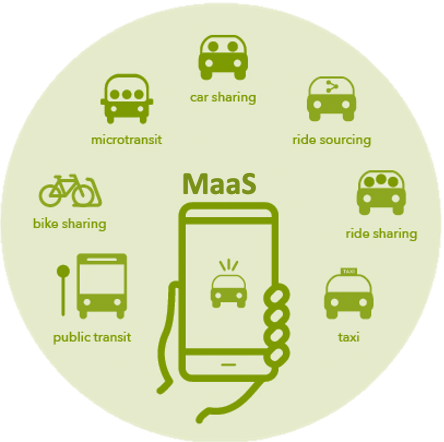SEAMLESS
Systematic Evaluations and Assessments of MaaS – Leading towards Sustainable Solutions. The project uses an evaluation framework developed within the KOMPIS project to assess environmental, economic and social impacts at three levels – micro (traveller), meso (organisation) and macro (city, region, country).

Objective
Via quantitative and qualitative analyses of data from different types of MaaS pilots, SEAMLESS will explore how and to what extent MaaS leads to, for example, changed travel behaviour, better accessibility, reduced emissions, increased energy efficiency and financially sustainable business opportunities, generating knowledge that can inform decision-making within both public organisations and among service developers. We expect the project to deliver results that assist Sweden in maintaining its position among the global pioneers of MaaS developments. The overall goal of the project is to deliver a systematic evaluation and assessment of MaaS based on three levels of analysis. That is, we will generate knowledge on the sustainability impacts of MaaS with regard to:
- A micro-level that focuses on different types individual travellers;
- A meso-level that focuses on organisations who develop MaaS services;
- A macro-level that focuses on cities, regions and nations;
- Syntheses between these levels.
ITRL’s Role in the project
ITRL is involved in Macro/system level assessments of MaaS (WP4) where the goal is to address MaaS evolution and impacts through co-creation and valorisation of future scenarios builds on what Jittrapitom et al. (2017) found regarding stakeholders’ approaches and “communication processes” for the development of MaaS in future deployments. For our research, this represents a strategic step to support the assessment of the effects of MaaS on mobility ecosystems without depending highly on data availability. Therefore, we explore the question: what directions MaaS will take in the future under the various uncertainties and to what extent will that lead to sustainable mobility system? We will explore this research question by co-constructing scenarios towards the year 2035 to understand the role of MaaS towards sustainable mobility systems.
There are two specific research objectives to achieve the overarching purpose:
objective 1: to identify methods that can be adapted to assess the system-level impacts of MaaS and objective 2: to identify and co-construct potential MaaS futures under various uncertainties and what potential impacts they may bring.
Ongoing work
MaaS has been trending in the last few years as a “potential viable solution” to achieve sustainable mobility. At the moment, it seems that we are still in the early stages of understanding whether MaaS will indeed prove to be a “viable solution”. In June 2022, we launched a survey to identify and validate uncertainties in MaaS development and implementation which was sent out to experts within the field of mobility. The experts belonged to different fields related to MaaS or mobility from academia (KTH, Aalto University), local (Stockholm City), and regional public authorities (Stockholm and Goteborg regions), etc. With about 30 responses, the survey helped us to identify and validate a list of possible uncertainties for MaaS development in the future.
Considering the list of possible uncertainties associated with factors such as MaaS governance/ownership, policy-related factors, and user adoption, one can only wonder if will there even be a MaaS in the future. We as a team started to wonder, in the next 12 years, by the year 2035, what possible direction will MaaS development be likely to take. Will there even be a MaaS, will it likely die down or be repackaged or will it continue to be in the same state as today? In search of answers to these questions, we will soon be launching our next survey with the MaaS experts, for their valuable help and support. This survey and follow-up interviews on the subject will help us co-construct MaaS futures which will then be will then be presented to MaaS operators in the European context to validate and understand how MaaS operators envision their MaaS in light of these possible MaaS futures.
Contact
For more information, please contact Bhavana Vadddadi .
Complete List of experts supporting the SEAMLESS Project
RISE, Chalmers University of Technology, KTH Royal Institute of Technology, Göteborgs stads parkeringsaktiebolag, Lindholmen Science Park AB, Move About AB, Region Skåne, Smartresenär i Sverige AB, Storstockholms Lokaltrafik, Svenska Taxiförbundet, Trafikverket, Västra Götalands läns landsting, Berkeley University of California

